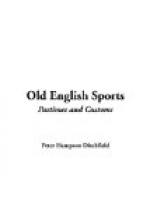With such feeble efforts of wit did the country folk try to beguile the long evenings. In those days there were no newspapers, very few books, even if they could be read, and the only means of gathering information from other parts of the country were the peddlers or wandering minstrels, who told them the news as they passed from place to place. Consequently, the above humble efforts of wit were not to be despised, and served to beguile the tediousness of the long winter’s night. Besides, the villagers had the carols to practise for Christmas, many of which were handed down from father to son for many generations, and probably both words and music received many variations in their course. Old collections of these carols still exist, such as the one entitled, “Good and True, Fresh and New, Christmas Carols,” which was made in the middle of the seventeenth century. As an instance of the way in which the words became changed as they were passed on by illiterate singers, I may mention a carol of which the refrain is now printed “Now Well, Now Well”; originally this must have been “Noel, Noel.” Some of the carols degenerated into songs about the wassail bowl, and the virtues of strong ale, and our forefathers were not unlike some of their children, who forget the Saviour in the enjoyment of His gifts. And besides the carols the villagers had the ordinary hymns to practise, with grand accompaniment of violins, flutes, clarionets, etc., for each village had its own musicians, who took great pride and interest in their playing, and used to practise together in the evenings. The old instruments have vanished: we have our organs and harmoniums: our choirs sing better and more reverently; but there are no reunions of the village orchestra, which used to afford so much pleasure to the rustics of former days.
In the lord’s hall there were plenty of sedentary games, and amongst these pre-eminently stands the noble pastime of chess. It is very ancient, and is supposed to have been invented by Xerxes, a philosopher in the court of Evil-Merodach, king of Babylon. It was well known in England before the Conquest, and Canute was very fond of the chessboard. King John was so engrossed in this game that when some messengers came to tell him that the French king had besieged one of his cities, he would not listen to them until he had finished his chess. The complicated movements of the various men seem to show that the game was developed and improved, and not the invention of one man, but few changes have been made during several centuries. Players are checkmated now in very much the same way as they were five hundred years ago.
Besides chess they had backgammon, or tables, as the game was called, Merelles, or Nine men’s Morris (which also found its way to the shepherds’ cottages), dice, and card games, some of which I have described before. Gambling was often carried on to a great extent, but evidently our modern people are not wiser than their ancestors in this matter; and instead of playing games for recreation, are not satisfied until they lose fortunes on the hazard of a dice or a card. Let us hope that men will at length become wiser as the world grows older.




